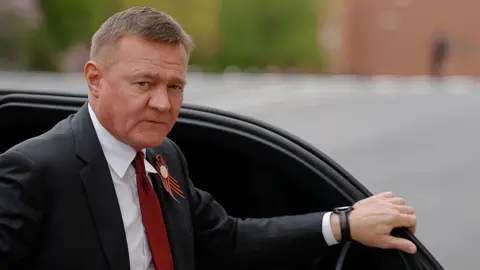Russian minister’s death serves as warning to political elite
49 minutes agoSteve RosenbergRussia editorReporting fromMoscow

 EPA
EPAIt was a dramatic start to the week in Russia.
On Monday morning, President Vladimir Putin sacked his transport minister, Roman Starovoit.
By the afternoon Starovoit was dead; his body was discovered in a park on the edge of Moscow with a gunshot wound to the head. A pistol, allegedly, beside the body.
Investigators said they presumed the former minister had taken his own life.
In the tabloid Moskovsky Komsomolets this morning there was a sense of shock.
“The suicide of Roman Starovoit just hours after the president’s order to sack him is an almost unique occurrence in Russian history,” the paper declared.
That’s because you need to go back more than thirty years, to before the fall of the Soviet Union, for an example of a government minister here killing themselves.
In August 1991, following the failure of the coup by communist hardliners, one of the coup’s ring leaders – Soviet interior minister Boris Pugo – shot himself.
The Kremlin has said little about Starovoit’s death.
“How shocked were you that a federal minister was found dead just hours after being fired by the president?” I asked Vladimir Putin’s spokesman Dmitry Peskov on a Kremlin conference call.
“Normal people cannot but be shocked by this,” replied Peskov. “Of course, this shocked us, too.
“It’s up to the investigation to provide answers to all the questions. While it’s ongoing, one can only speculate. But that’s more for the media and political pundits. Not for us.”
The Russian press has, indeed, been full of speculation.
Today several Russian newspapers linked what happened to Roman Starovoit to events in the Kursk region that borders Ukraine. Before his appointment as transport minister in May 2024, Starovoit had been the Kursk regional governor for more than five years.
Under his leadership – and with large sums of government money – Governor Starovoit had launched the construction of defensive fortifications along the border. These were not strong enough to prevent Ukrainian troops from breaking through and seizing territory in Kursk region last year.
Since then, Starovoit’s successor as governor, Alexei Smirnov, and his former deputy Alexei Dedov have been arrested and charged with large-scale fraud in relation to the construction of the fortifications.
“Mr Starovoit may well have become one of the chief defendants in this case,” suggested today’s edition of the business daily Kommersant.
The Russian authorities have not confirmed that.
But if it was fear of prosecution that drove a former minister to take his own life, what does that tell us about today’s Russia?
“The most dramatic part of this, with all the re-Stalinisation that has been happening in Russia in recent years, is that a high-level government official [kills himself] because he has no other way of getting out of the system,” says Nina Khrushcheva, professor of International Affairs at The New School in New York.
“He must have feared that he would receive tens of years in prison if he was going to be under investigation, and that his family would suffer tremendously. So, there’s no way out. I Immediately thought of Sergo Ordzhonikidze, one of Stalin’s ministers, who [killed himself] in 1937 because he felt there was no way out. When you start thinking of 1937 in today’s environment that gives you great pause.”
Roman Starovoit’s death may have made headlines in the papers here. But this “almost unique occurrence in Russian history” has received minimal coverage on state TV.
Perhaps that’s because the Kremlin recognises the power of television to shape public opinion. In Russia, TV is more influential than newspapers. So, when it comes to television, the authorities tend to be more careful and cautious with the messaging.
Monday’s main evening news bulletin on Russia-1 included a four-minute report about Putin appointing a new acting transport minister, Andrei Nikitin.
There was no mention at all that the previous transport minister had been sacked. Or that he’d been found dead.
Only forty minutes later, towards the end of the news bulletin, did the anchorman briefly mention the death of Roman Starovoit.
The newsreader devoted all of 18 seconds to it, which means that most Russians will probably not view Monday’s dramatic events as a significant development.
For the political elite, it’s a different story. For ministers, governors, and other Russian officials who’ve sought to be a part of the political system, what happened to Starovoit will serve as a warning.
“Unlike before, when you could get these jobs, get rich, get promoted from regional level to federal level, today, that is clearly not a career path if you want to stay alive,” says Nina Khrushcheva.
“There’s not only no upward mobility to start with, but even downward mobility ends with death.”
It’s a reminder of the dangers that emanate from falling foul of the system.
More on this storyRussiaVladimir Putin